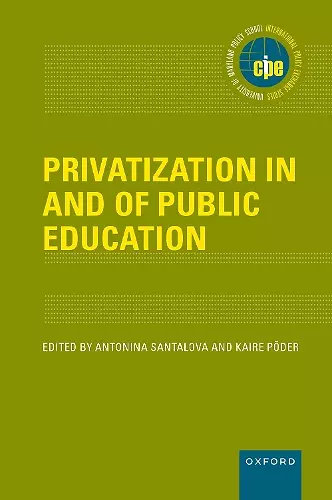Privatization in and of Public Education
Antonina Santalova editor Kaire Põder editor
Format:Hardback
Publisher:Oxford University Press Inc
Published:20th Jun '24
Should be back in stock very soon

Privatization of education has become a prevalent global trend, representing a significant shift from viewing education as a public good to considering it as a private commodity. This transformation is closely tied to the modernization of the state under the principles of neoliberalism. A comprehensive analysis, as presented in this book using Ball and Youdell's framework, sheds light on the diverse patterns of privatization in education, categorizing them into two types: exogenous and endogenous. The term "exogenous" refers to policies that grant the private sector increased rights and authority to deliver education services. On the other hand, "endogenous" pertains to policies aimed at making public schools operate more like businesses. This paradigm shift encompasses various elements, including parental school choice, inter-school competition, accountability to parents, and increased autonomy for schools. Still, the book shows that advantages of education privatization are evident, such as heightened efficiency and the ability to cater to the diverse needs of the public schooling system. However, it is crucial to recognize that these benefits come with an inadequately addressed trade-off between efficiency and equity or inclusion. This trade-off stands as the most pressing contemporary challenge of education privatization, affecting various contexts and cases explored within the book. Prominent researchers in the field present a multi-faceted view of the forms and consequences of education privatization. Privatization in and of Public Education encompasses a wide range of countries and regions, including both developed and developing nations, offering valuable case studies that illustrate how privatization is unfolding across the globe. By examining the driving factors behind education privatization, such as economic, political, and social influences, the authors provide a comprehensive understanding of this global phenomenon.
Privatization in and of Public Education reflects the complexities of current global transformations in the provision, regulation, and funding of public education. The book shows how 'the private' is progressively embedded in forms of education within and outside education systems and in different territories. One of the great contributions of the book is the inclusion of forms of privatization in non-Western states, such as China, Russia, former soviet republics, or postcolonial states. Their inclusion proves that the scope and extent of privatization is becoming really global, and the need as social scientists to understand its implications for equity and social justice. * Xavier Bonal, Universitat Autònoma de Barcelona *
Societies are evolving to become more inclusive, diverse, and pluralistic. Education systems are also changing, moving away from the traditional, uniform models publicly provided through common schools to allow for different curriculums, management practices, and teaching methods. This increasing diversity in schools, with private providers playing a more significant role, can widen education disparities between the wealthy and the poor. With a future characterized by growing income disparities driven by technological progress and globalization, Privatization in and of Public Education is a stepping stone in the long-overdue agenda of reinventing education systems to fulfill their promise of being a force for equality and economic mobility. * Rafael de Hoyos, Program Leader, Human Development, EU Member States, World Bank *
ISBN: 9780197673508
Dimensions: 150mm x 224mm x 31mm
Weight: 612g
352 pages